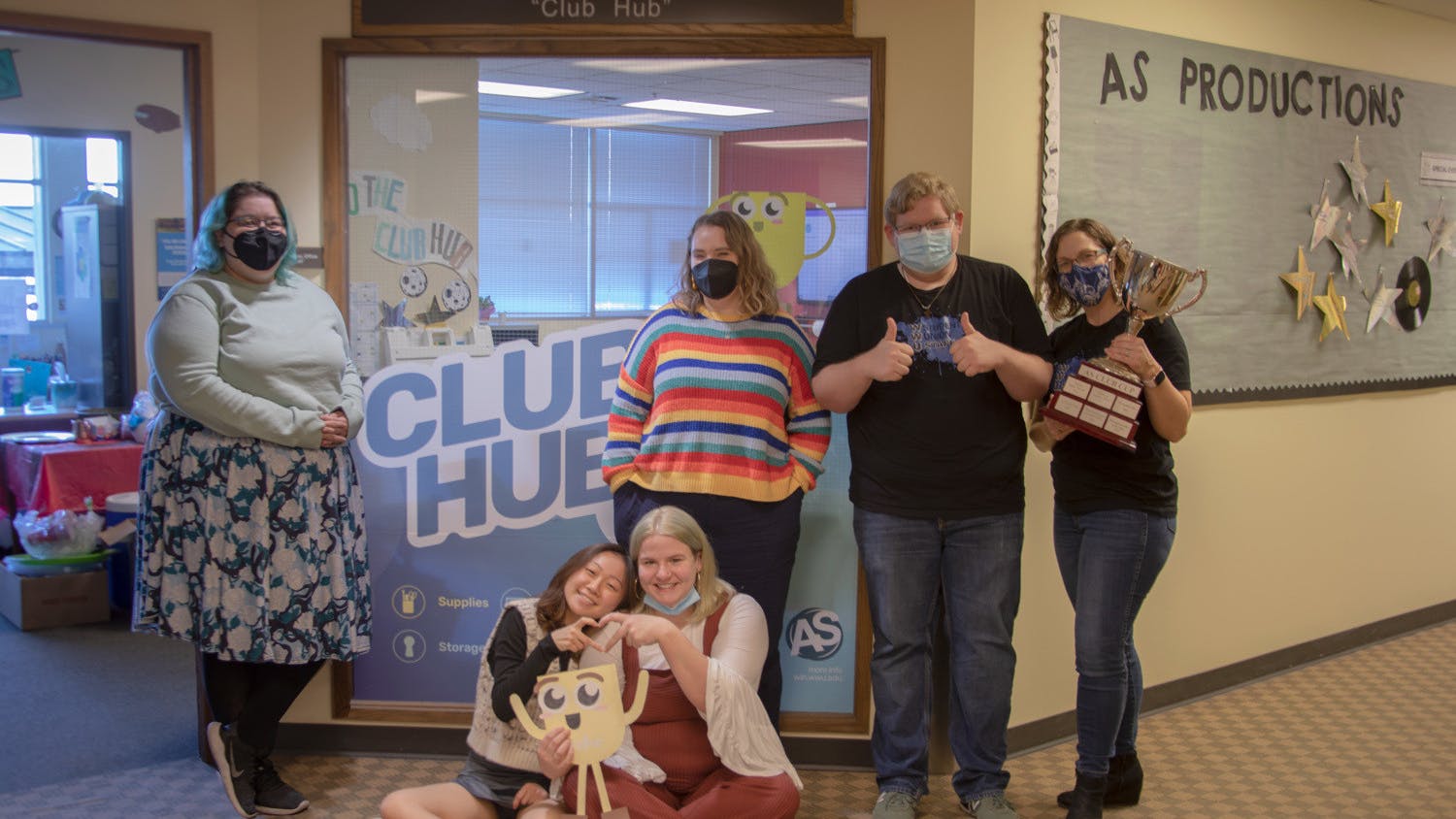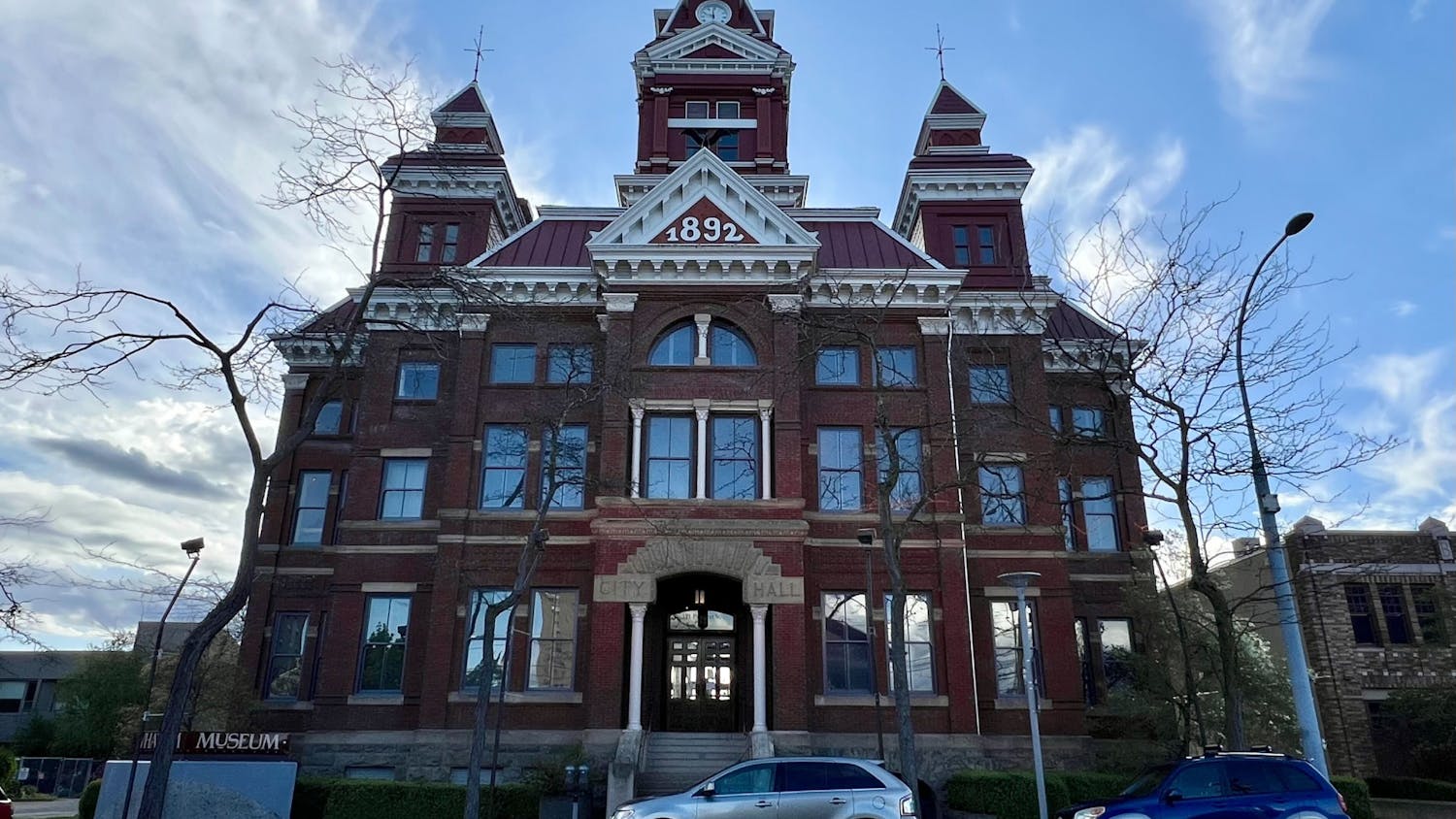Washington State Supreme Court Justice Mary Yu speaking at the Supreme Court Justice panel on Wednesday, Oct. 9 //Photo by Claire Ott
By Nolan Baker
The Wilson Library reading room, known colloquially as “the Harry Potter room,” is normally a dead silent place for students to work diligently under the beautiful natural light coming in through stained glass windows. Throughout the day, the cacophonous hall only makes a few peeps from creaky chairs and the slight clacking of keyboards.
On Wednesday and Thursday this week, the reading room looked-- and sounded-- completely different. The heavy oak desks were nowhere to be found. The creaky chairs were sectioned off into neat rows. It transformed into the highest court in the state of Washington.
The Washington state Supreme Court convened at Western on Thursday morning to hear oral arguments from attorneys on three separate cases.
The first case was State of Washington v. Keith Adair Davis and was held at 9 a.m. The audience summarized the case with questions such as , “Can a physically present defendant be found ‘absent’? What must courts consider before removing disruptive defendants?”
The second case in the 10 a.m. slot involved a man who was refused a position at a church in Seattle because of his identity as a gay man, Matt Woods v. Seattle’s Union Gospel Mission.
[caption id="attachment_33035" align="alignright" width="300"] Rukhsar Sadat, a third year student, asking the Washington State Supreme Court a question at the panel on Wednesday, Oct. 9 // Photo by Claire Ott[/caption]
The final case, presented at 1:30 p.m., was Jessica Wrigley v. State of Washington; Department of Social & Health Services; et al.. Documents available at the argument described as, “Did DSHS have a duty to investigate a mother’s ‘report’ of future child abuse by her child’s father?”
Each case was argued by attorneys representing both parties, who were constantly and rigorously questioned by the seasoned justices.
Three times a year, the Court goes to different locations around Washington to connect with citizens, answer questions and hear cases in front of a public audience.
The Court has three separate four-month sessions every year, and in each session they hear an average of 45 cases, according to brochures available at the events. The “travelling court” appearances are used as a way to connect with the citizenry and lift the curtain on how the most influential court in the state goes about their business.
“It’s an opportunity,” said Becca Kenna-Schenk, the executive director of government relations for Western. “Just to see, literally see and hear, what deliberations of the Supreme Court look and feel and sound like.”
[caption id="attachment_33036" align="alignleft" width="300"]
Rukhsar Sadat, a third year student, asking the Washington State Supreme Court a question at the panel on Wednesday, Oct. 9 // Photo by Claire Ott[/caption]
The final case, presented at 1:30 p.m., was Jessica Wrigley v. State of Washington; Department of Social & Health Services; et al.. Documents available at the argument described as, “Did DSHS have a duty to investigate a mother’s ‘report’ of future child abuse by her child’s father?”
Each case was argued by attorneys representing both parties, who were constantly and rigorously questioned by the seasoned justices.
Three times a year, the Court goes to different locations around Washington to connect with citizens, answer questions and hear cases in front of a public audience.
The Court has three separate four-month sessions every year, and in each session they hear an average of 45 cases, according to brochures available at the events. The “travelling court” appearances are used as a way to connect with the citizenry and lift the curtain on how the most influential court in the state goes about their business.
“It’s an opportunity,” said Becca Kenna-Schenk, the executive director of government relations for Western. “Just to see, literally see and hear, what deliberations of the Supreme Court look and feel and sound like.”
[caption id="attachment_33036" align="alignleft" width="300"] Steven Gonzalez (left), Mary Yu (center) and Debra Stephens (right) at the Supreme Court Justice panel on Wednesday, Oct. 9. // Photo by Claire Ott[/caption]
The last time the state Supreme Court visited Western’s campus was Oct. 16, 2003. Since then, the roster has changed considerably, with justices Debra Stephens, Charles Wiggins, Steven Gonzalez, Sheryl Gordon-McCloud and Mary Yu joining the bench.
According to Kenna-Schenk, Western President Sabah Randhawa submitted a formal invitation to the Court last year, and in the spring they received notice that their invitation had been accepted.
“We were thrilled and honored that the court accepted our invitation,” Kenna-Schenk said.
Along with holding three oral arguments on campus Thursday, the justices also visited political science classes taught by professors Kate Destler, Paul Chen, Vicki Hsueh and Todd Donovan. On Wednesday, they attended lunch with a group of 50 students to chat about their own college experiences and what led them to careers in law.
Chen’s “Civil Rights and Civil Liberties” and “Intro to Law and Legal Systems” classes had the honor of hosting some of the justices.
“It’s wonderful how you can see what the justices are doing,” Chen said. “If anything, it shows that the justices are just ordinary people.”
Chen also moderated the first panel discussion titled “Judicial Role in Democracy,” which featured justices Susan Owens, Debra Stephens, Steven Gonzalez and Mary Yu.
Yu is the newest member of the Supreme Court as of 2014. She is the first LGBTQ justice, the first Asian-American justice and the first Latina justice.
“It’s not the person who shouts the loudest that wins in our world,” Yu said during the panel. “It’s not the person that gets the last tweet out.”
[caption id="attachment_33037" align="alignright" width="300"]
Steven Gonzalez (left), Mary Yu (center) and Debra Stephens (right) at the Supreme Court Justice panel on Wednesday, Oct. 9. // Photo by Claire Ott[/caption]
The last time the state Supreme Court visited Western’s campus was Oct. 16, 2003. Since then, the roster has changed considerably, with justices Debra Stephens, Charles Wiggins, Steven Gonzalez, Sheryl Gordon-McCloud and Mary Yu joining the bench.
According to Kenna-Schenk, Western President Sabah Randhawa submitted a formal invitation to the Court last year, and in the spring they received notice that their invitation had been accepted.
“We were thrilled and honored that the court accepted our invitation,” Kenna-Schenk said.
Along with holding three oral arguments on campus Thursday, the justices also visited political science classes taught by professors Kate Destler, Paul Chen, Vicki Hsueh and Todd Donovan. On Wednesday, they attended lunch with a group of 50 students to chat about their own college experiences and what led them to careers in law.
Chen’s “Civil Rights and Civil Liberties” and “Intro to Law and Legal Systems” classes had the honor of hosting some of the justices.
“It’s wonderful how you can see what the justices are doing,” Chen said. “If anything, it shows that the justices are just ordinary people.”
Chen also moderated the first panel discussion titled “Judicial Role in Democracy,” which featured justices Susan Owens, Debra Stephens, Steven Gonzalez and Mary Yu.
Yu is the newest member of the Supreme Court as of 2014. She is the first LGBTQ justice, the first Asian-American justice and the first Latina justice.
“It’s not the person who shouts the loudest that wins in our world,” Yu said during the panel. “It’s not the person that gets the last tweet out.”
[caption id="attachment_33037" align="alignright" width="300"] Rukhsar Sadat, a third year student, speaking with Justice Mary Yu at the Supreme Court Justice panel on Wednesday, Oct. 9. //Photo by Claire Ott[/caption]
In a brief statement to the Court before oral arguments began Thursday morning, President Randhawa said, “We are truly honored to have the opportunity to host the court this year and we hope you enjoy your visit.”
President Randhawa understood the impact a visit from the state Supreme Court can have on the student body.
“For our students, faculty and staff to engage directly with you and see the court in action is a wonderful educational experience that I’m sure they will carry with them for years to come,” Randhawa said.
Chief Justice Mary Fairhurst said it was her second time coming to Western with travelling court.
“We’ve been really treated so hospitably, and we have so greatly enjoyed our visit,” she said before oral arguments began.
“I regret I won’t be returning with travelling court,” Chief Justice Fairhurst said. “But with a niece who was a graduate, I assure [you] I’ll be back to visit.”
To watch replays with full transcripts of the three oral arguments held in the Wilson Library Reading Room, click below.
State of Washington v. Keith Adair Davis
9:00 a.m. hearing
Matt Woods v. Seattle's Union Gospel Mission
10:00 a.m. hearing
Jessica Wrigley v. State of Washington, et al
Rukhsar Sadat, a third year student, speaking with Justice Mary Yu at the Supreme Court Justice panel on Wednesday, Oct. 9. //Photo by Claire Ott[/caption]
In a brief statement to the Court before oral arguments began Thursday morning, President Randhawa said, “We are truly honored to have the opportunity to host the court this year and we hope you enjoy your visit.”
President Randhawa understood the impact a visit from the state Supreme Court can have on the student body.
“For our students, faculty and staff to engage directly with you and see the court in action is a wonderful educational experience that I’m sure they will carry with them for years to come,” Randhawa said.
Chief Justice Mary Fairhurst said it was her second time coming to Western with travelling court.
“We’ve been really treated so hospitably, and we have so greatly enjoyed our visit,” she said before oral arguments began.
“I regret I won’t be returning with travelling court,” Chief Justice Fairhurst said. “But with a niece who was a graduate, I assure [you] I’ll be back to visit.”
To watch replays with full transcripts of the three oral arguments held in the Wilson Library Reading Room, click below.
State of Washington v. Keith Adair Davis
9:00 a.m. hearing
Matt Woods v. Seattle's Union Gospel Mission
10:00 a.m. hearing
Jessica Wrigley v. State of Washington, et al





